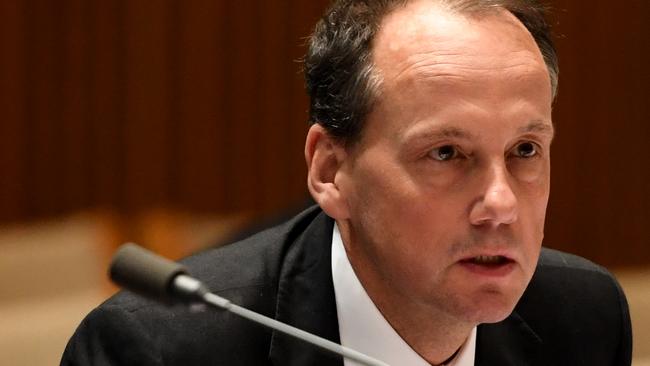ASIC backs delay to Hayne banking reforms
With the economy under stress, now is not the right time to be pushing through banking changes coming from the Hayne royal commission, ASIC says.

Australian Securities and Investments Commission chair James Shipton has swung his support behind the federal government’s decision to delay implementing a raft of recommendations flowing from the banking royal commission by six months, arguing given the “strain and stress” the economy was currently experiencing it was the right move.
Testifying before the Senate Select Committee into COVID-19 and the Australian government’s response into the health crisis on Thursday, Mr Shipton said there had been “points of discussions and engagement” with the banking industry in regards to delaying the reforms but stopped short of saying the corporate regulator had been directly lobbied by the banks.
Mr Shipton also told the committee ASIC was watching out for scams related to the early release of superannuation, including people impersonating super funds or other officials looking to defraud Australian savers. The corporate cop would also apply a sharp focus on market disclosures by public companies to ensure that despite a relaxation by the Federal Treasurer of continuous disclosure laws, with criminal sanctions still available to combat any misdeeds while civil provisions have been halted.
In a clear warning to directors looking to skirt continuous disclosure obligations in the midst of the tumultuous environment, he reminded the committee ASIC had “formidable regulatory sanctions’’ available to it.
Meanwhile, to date, ASIC had not witnessed any large uptick in payday loans as many households struggle under the weight of the economic fallout from the health crisis -- although there was a rise in reports to it on financial scams in the health and economic crisis. While the regulator warned there could be an increase in insolvencies and it was keeping a watchful eye too on any individuals attempting evade the law and creditors through “phoenix companies”.
The outbreak of the coronavirus pandemic has seen the government and regulators act by relaxing some corporate laws, or delaying the introduction of new provisions, causing some concerns among investors.
Earlier this month Treasurer Josh Frydenberg announced that reforms proposed by the Hayne royal commission into misconduct by the financial services industry, slated to be introduced by July, are to be delayed until the end of the year. Further reforms set for December are to be pushed back and implemented in July next year. The government’s Hayne reform roadmap aimed to have 90 per cent of its commitments enacted by the end of June 2020, including introducing legislation banning the hawking of superannuation and insurance products and require an annual renewal of financial advice.
The Morrison government has also temporarily amended the continuous disclosure provisions that apply to companies and their officers’ to enable them to more confidently provide guidance to the market during the coronavirus crisis.
Asked by Senator Peter Whish-Wilson about that decision on Hayne reforms, Mr Shipton said ASIC was supportive the six month deferral of the Hayne reforms given the pressures on banks and the broader economy at the moment.
Mr Shipton said ASIC held discussions with the government and the banking sector on the push back of the reforms.
“Yes we did liaise with the government on that announcement and we spoke as we ordinarily do about the reform agenda, and we also made some similar announcements ourselves in relation to the deferral of at least two matters that we are working through,’’ Mr Shipton told the committee.
But he did not confirm the banks had directly lobbied ASIC.
“There were certainly points of discussion and engagement but again we provided robust and independent advice for government and regards to our own decision making we believe we acted in the best interests of the economy as a whole noting that there is significant strain and stress by banks and financial services entities right now and a deferment at least of the items that are within our control was actually in the best interests of the economy.”
He said ASIC remained supportive of the eventual implementation of the reforms.
“We remain very committed to the implementation of these reforms with the new implementation due dates.’’
More Coverage








To join the conversation, please log in. Don't have an account? Register
Join the conversation, you are commenting as Logout